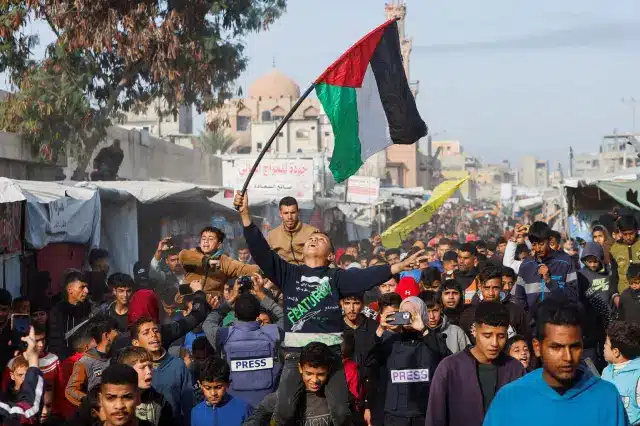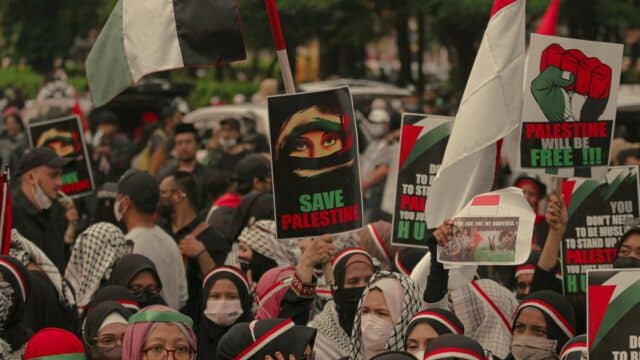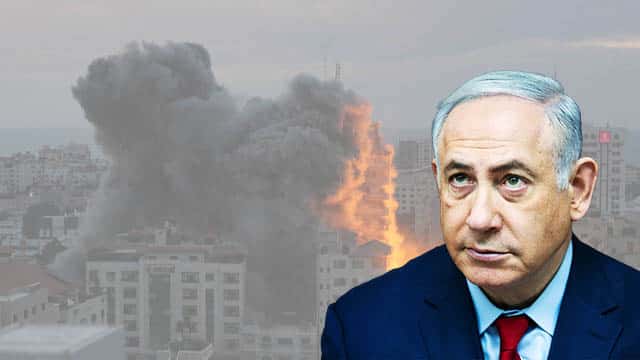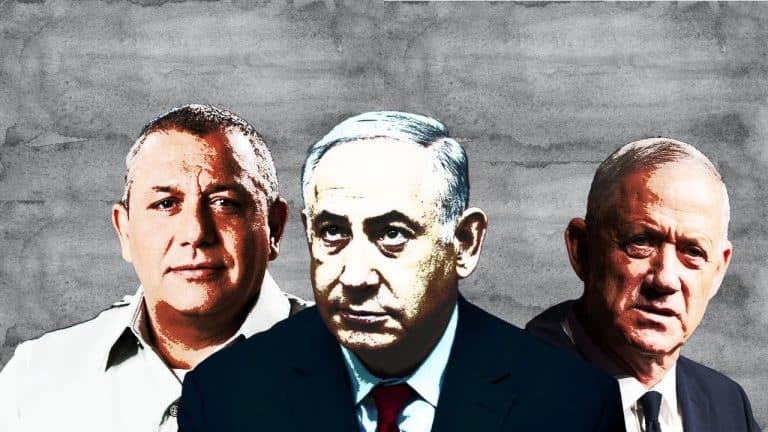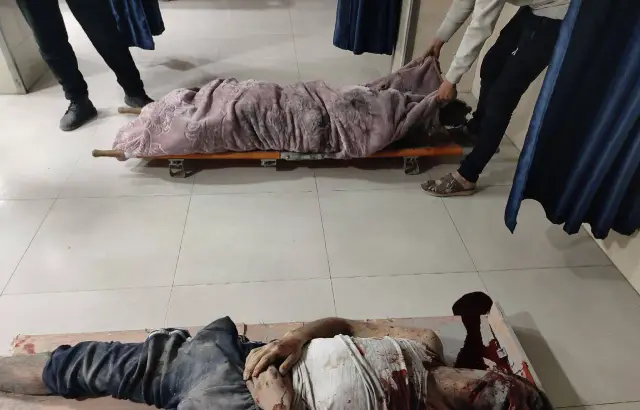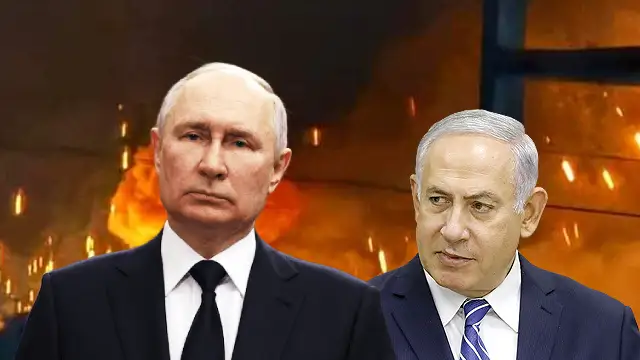The West Asian geopolitical landscape is going through a quick transformation as US President Joe Biden’s outgoing administration has been trying to take credit for the Hamas-Israel Gaza ceasefire deal, which needs approval from the Zionist parliament on Thursday, January 16th. The Hamas-Israel Gaza ceasefire deal is surely a calculative move by Washington DC that has provided Iran’s moderate President Dr Massoud Pezeshkian with an opportunity to propose the revival of the 2015 nuclear deal with the US-led collective West, called the Joint Comprehensive Plan of Action (JCPOA), which Donald Trump had scrapped in 2018.
The Hamas-Israel Gaza ceasefire deal isn’t solely what the Zionist forces demanded after running what’s now labelled as a “genocide” in Gaza over the past 15 months. Still, the deal is pushed with a sense of urgency at a time when Dr Pezeshkian is on his two-nation tour of Tajikistan and Russia, and also pushing for the revival of the JCPOA with the incoming Trump 2.0 administration.
Dr Pezeshkian is expected to meet Russian President Vladimir Putin on Friday, January 17th, and sign a strategic partnership agreement, which will provide Tehran with leverage amid constant threats from regional foe Israel. In his bid to break the ice with Mr Trump, Dr Pezeshkian managed to go live on American broadcaster NBC, where an extensive interview of his was broadcast on Wednesday, January 15th, a significant development before his Russia visit.
Reviving the JCPOA
In his interview, Dr Pezeshkian reiterated that the Islamic Republic’s nuclear programme is peaceful; it’s for its energy requirements, and Tehran doesn’t seek “nuclear weaponry” in the region. This is what Tehran has been claiming for over a decade and a half, yet the US-led collective West has refused to believe its version.
Considering the complex geopolitical scenario, and Iran’s long-term strategic interests, Dr Pezeshkian seems to be offering a fig leaf to the West by claiming that Tehran seeks no confrontation and emphasises peace.
“I do hope that Trump will conduce to peace in the region and the world not, conversely, contribute to bloodshed or war,” he said during his interview with NBC when he was asked for a message for the Republican president.
Dr Pezeshkian won the snap presidential elections in 2024, promising the revival of the JCPOA. Iran’s desire to revive the deal is exemplified by Javad Zarif, the former negotiator of the deal, becoming the vice president.
Talking to American host Lester Holt, Dr Pezeshkian said that Iran stresses commitments arising out of dialogues rather than merely having dialogues.
“The problem we have is not in dialogue. It’s in the commitments that arise from talks and dialogue that we’ll have to commit to,” the president said adding, “It was the other party did not live up to its promises and obligations,” referring to Mr Trump’s unilateral withdrawal from the JCPOA in 2018.
Mr Trump’s 2018 decision was reportedly shaped by the so-called secret Iranian nuclear project documents that Israel claimed its secret service agency Mossad had retrieved from a secret facility in the Islamic Republic. Iran has denied the existence of any nuclear weapon programme.
During his first tenure, Mr Trump promised “maximum pressure” on Iran to force it to shed its nuclear programme. Mr Trump has not made any new promises regarding buying peace with Iran during his 2024 campaign and it’s expected that his government will continue with the unilateral sanctions on Iran.
In this scenario, by underscoring the need to revive the JCPOA at the beginning of Mr Trump’s inauguration, Dr Pezeshkian’s administration is creating an embarrassing situation for the Republican administration.
Firstly, if Mr Trump, who has always put forward a non-interventionist foreign policy during his campaigns, remains indifferent to Iran’s proposals, then it can be blamed for being complicit in fuelling further conflicts in West Asia, which is a crucial region for the US.
Secondly, if Mr Trump’s administration restarts negotiations with Iran, then it will contradict the billionaire-turned-politician’s earlier stance where he had singled out Iran as a major threat in the region.
Moreover, Iran doesn’t merely want a discussion but a deal with due honour.
A deal with honour
Iran is seeking an equality-based deal with the West. Earlier, while announcing the interview on social media platform X (formerly Twitter), Mohammad-Mehdi Tabatabai, the deputy director of communication and information at the President’s Office, highlighted that Iran “seeks peace and de-escalation in the region and the world, condemns warmongering, encroachments, and genocide by the Zionist regime and is ready for equal and honourable negotiation.”
While talking to Mr Holt, Dr Pezeshkian clarified that Iran doesn’t seek confrontation in the region but is also not scared of the US-backed Israel. Earlier, Mr Trump had claimed that Israel would hit Iran’s nuclear facilities. Such an action can further escalate tensions, and Dr Pezeshkian warned against such adventurism.
“We will react to any action. We do not fear war, but we do not seek it,” he told Mr Holt.
Dr Pezeshkian denied Iran’s involvement in the attempt to assassinate Mr Trump in 2024, during his campaign trail. He said that Iran neither does such things and won’t even plan in the future as well. He, however, accused Israel of using such narratives to spread Islamophobia.
“This is another one of those schemes that Israel and other countries are designing to promote Iranophobia. …Iran has never attempted to nor does it plan to assassinate anyone. At least as far as I know,” the Iranian president said.
While Iran attempts an honourable conclusion of the JCPOA with the US-led West, the latter shows no desire for a peaceful solution but has been pushing confrontation for years.
In this scenario, while an ideal honourable solution looks aloof, Iran appears to be ready to give away much to buy peace as recent attacks by Israel have decimated the “Axis of Resistance” and frightened the elites of Tehran. Although Iran hit Israel with missiles twice in 2024, initiating its maiden direct conflict with the occupation state, Dr Pezeshkian and Supreme Leader Sayyed Ali Khamenei are reluctant to engage in any conflict due to the precarious state of Iran’s economy. It’s for the same reason that Tehran declined to support Dr Bashar al-Assad’s government in Syria when the jihadists backed by the collective West, Turkiye and Israel launched a sudden offensive in November 2024.
The compulsion
While Iran must have the JCPOA revived for its economy’s sake, it’s also important for the West to ensure that Iran can be turned into a neutral force in West Asia rather than leaving it as a foe. While the JCPOA will allow Iran to balance its foreign relations with the West and Russia-China axis, the push for the Hamas-Israel ceasefire by the US is also due to its compulsion to secure the maritime route through the Gulf of Aden in the Red Sea, where the Houthi rebels of Yemen have laid a siege for over 14 months.
If Iran gets a scope to normalise ties with the West at the cost of a ceasefire in Gaza, the Yemeni rebels will also de-escalate and save the western corporations from spending billions on a longer sea route through the Cape of Good Hope to transport cargo between Asia and Europe.
With Iran insisting on a deal with honour and the West pushing the ceasefire between Hamas and Israel, it’s important to observe whether there will be a real revival of JCPOA under Mr Trump and whether Tehran’s relations with the West will normalise.


